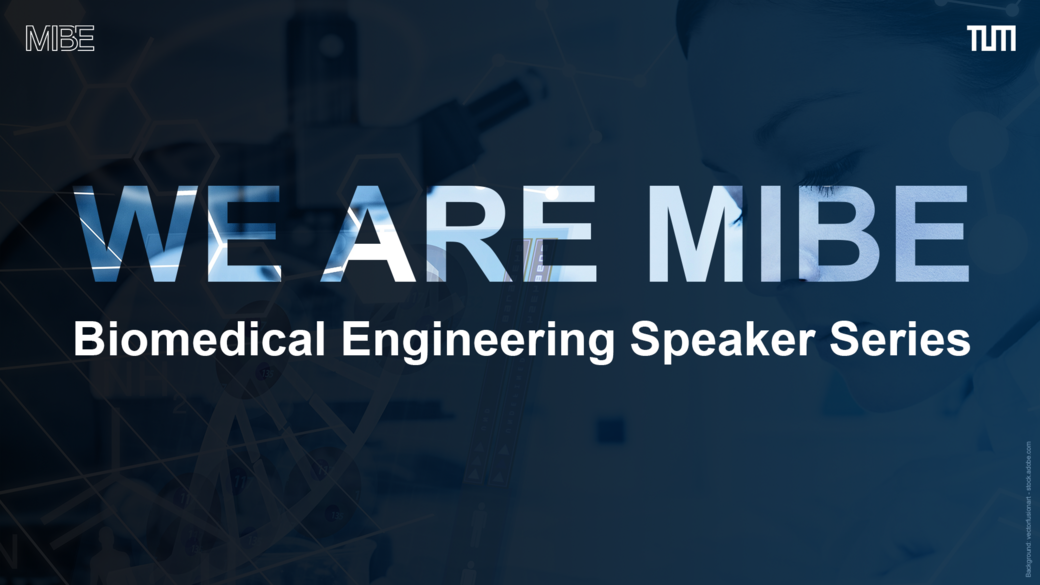In dieser Vortragsreihe geben pro Termin zwei Principal Investigators (PIs) des MIBE spannende Einblicke in ihre Forschung. Im Anschluss an die etwa 25-minütigen Vorträge gibt es Gelegenheit zum Austausch und Netzwerken vor Ort.
Prof. Dr. Vasilis Ntziachristos: Advances in optical and optoacoustic imaging and sensing
Prof. Dr. Franz Pfeiffer: X-ray darkfield imaging - from basic research to first medical applications
Datum und Uhrzeit: Mittwoch, 28.02.2024, 16:15 – ca. 17:15 Uhr, anschließendes Networking
Ort: MIBE Hörsaal (Raum E.126), Boltzmannstraße 11, 85748 Garching und Zoom
Über die Vortragenden
Prof. Vasilis Ntziachristos

Prof. Ntziachristos erforscht die Entwicklung neuartiger optischer und optoakustischer Bildgebungsverfahren, von Sensoren und Methoden der Datenverarbeitung. Ziel ist es, kosteneffiziente und minimal-invasive Technologien zur Vorbeugung und Früherkennung von Krankheiten zu entwickeln, um eine bessere Gesundheitsvorsorge und Behandlung von Patienten zu ermöglichen. Seine Forschung umfasst dabei das gesamte Spektrum von theoretischen und methodischen Ansätzen, Grundlagenforschung, bis hin zur klinischen Anwendung und unternehmerischer Umsetzung.
Diabetes untersuchen mit Hautscanner und KI - Pressemitteilung (2023)
Tiefe Einblicke mit dem Haut-Scanner - Pressemitteilung (2021)
Hochauflösende 3D-Ansicht des Tumorinneren - Pressemitteilung (2020)
Bild: Stephan Rumpf
Prof. Franz Pfeiffer

Prof. Pfeiffer forscht auf dem Gebiet der biomedizinischen Röntgenphysik. Im Fokus stehen neue bildgebende Methoden zur verbesserten Früherkennung und detaillierten Erforschung von Krankheiten, wie Krebs, Lungenerkrankungen und Osteoporose. Sein wissenschaftliches Engagement reicht von grundlagenorientierter Forschung mit hochbrillanten Röntgenstrahlen an internationalen Großforschungsanlagen bis hin zu angewandter Erforschung neuer Konzepte in der Radiologie. Prof. Pfeiffers wichtigster wissenschaftlicher Beitrag ist die Entdeckung einer neuartigen Methode zur Phasenkontrast-Bildgebung mit Röntgenstrahlen und deren Translation hin zu vorklinischen und klinischen Anwendungen, vor allem zur besseren Diagnostik von Lungenkrankheiten.
Prof. Franz Pfeiffer für den A. F. Harvey Engineering Forschungspreis 2023 nominiert
Neue Röntgentechnologie kann die Covid-19-Diagnose verbessern - Pressemitteilung (2022)
Neue Technologie für klinische Computertomographie - Pressemitteilung (2022)
Bild: Andreas Heddergott / TUM
Zu den Vortragsthemen
Advances in optical and optoacoustic imaging and sensing
Biological discovery is a driving force of biomedical progress. With rapidly advancing technology to collect and analyze information from cells and tissues, we generate biomedical knowledge at rates never before attainable to science. Nevertheless, conversion of this knowledge to patient benefits remains a slow process. To accelerate the process of reaching solutions for healthcare, it would be important to complement this culture of discovery with a culture of problem-solving in healthcare. The talk focuses on recent progress with optical and optoacoustic technologies, as well as computational methods, which open new paths for solutions in biology and medicine. Particular attention is given on the use of these technologies for early detection and monitoring of disease evolution. The talk further shows new classes of imaging systems and sensors for assessing biochemical and pathophysiological parameters of systemic diseases, complement knowledge from –omic analytics and drive integrated solutions for improving healthcare.
X-ray darkfield imaging - from basic research to first medical applications
The basic physics of X-ray image formation in medical imaging has remained essentially unchanged since the discovery of X-rays by Roentgen over one hundred years ago. The approach in medical imaging relies on X-ray attenuation as the sole source of contrast and uses the particle picture to describe and interpret image formation. This approach ignores another potentially more useful source of contrast, the wave-optic interaction of X-rays with matter. Similar to light microscopy, advanced imaging concepts such as phase contrast and/or dark-field imaging can provide tremendous improvements in image quality and sensitivity.
In this talk, Prof. Pfeiffer will present his research group's recent results from the world's first application of dark-field radiography in patients, for which they developed, built, and installed a first dark-field chest X-ray system at the TUM University Hospital Klinikum rechts der Isar. With this system, they were able to demonstrate that dark-field imaging can significantly improve the diagnosis of lung diseases such as chronic obstructive pulmonary disease (COPD), severe acute respiratory syndrome coronavirus 2 (SARS-CoV-2), and pneumothorax.
These findings are also important from a societal perspective, as respiratory diseases are a major cause of chronic illness and mortality worldwide. While modern medical imaging techniques now provide detailed diagnostic information, there is still a lack of a low-dose, rapid and cost-effective option for early detection and/or follow-up.
Weitere Informationen
Livestream
Die Veranstaltung wird über Zoom gestreamt: https://tum-conf.zoom.us/j/612 2888 8412 Passcode: waMIBE
Anerkennung Qualifizierungsprogramm Promovierende
Bei fachlicher Eignung kann die regelmäßige Teilnahme an den Vorträgen als Fachspezifische Qualifizierung angerechnet werden.
Registrierungsformular für Promovierende
Weitere Termine dieser Reihe im WiSe 2023/24
Dieser Termin ist der letzte der Vortragsreihe im WiSe 2023/24.
Die nächsten We are MIBE Vorträge finden im SoSe 2024 an folgenden Terminen jeweils Mittwoch um 16:15 Uhr statt:
- 17. April 2024 Prof. Susanne Kossatz & Prof. Wolfgang Weber
- 5. Juni 2024 Prof. Jürgen Ruland & Prof. Daniela Pfeiffer
- 10. Juli 2024 Prof. Bernhard Hemmer & Prof. Werner Hemmert
